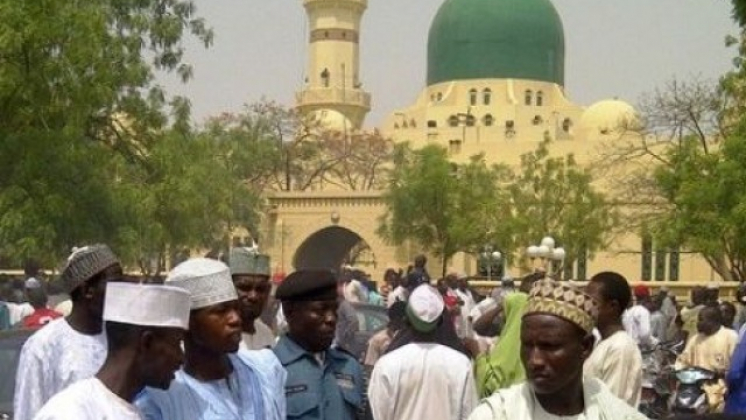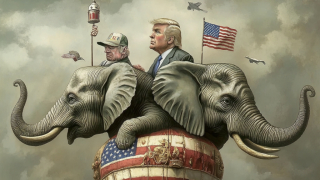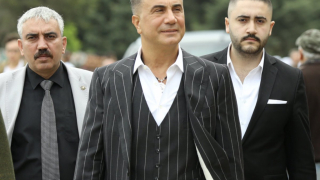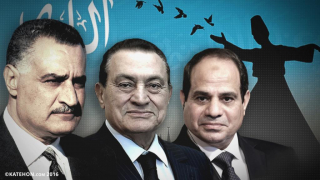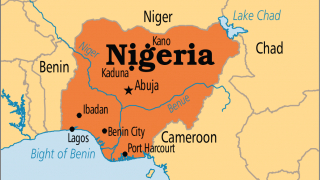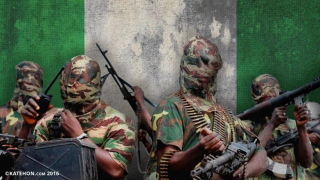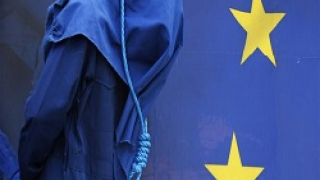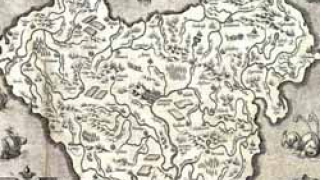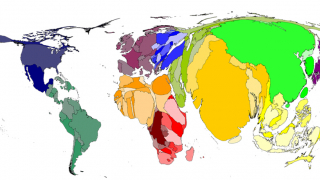The Under-Reported Issues of Northern Nigeria. Part II
22.08.2017
That Could Potentially Be Nigeria’s and Africa’s Next Socio-Security Challenge.
Forcible conversion to Islam in historical context
In 1804, Shehu Othman Danfodio led itinerant Fulani from the Futa Jallon heights in present day Gambia and Senegal to settled in present day northern Nigeria. Danfodio led a revolt against the existing Habe dynasties and supplanted them with Fulani emirs. The Hausa was forcibly Islamized. The fulani jihad, and Islam made inroads into other areas not inhabited by the Fulani or Hausa but were successfully resisted in much of today’s middle belt.
It was the British that brought the non-hausa/Fulani peoples who were never conquered by the latter into the rule of the emirate. Called indirect rule, it suited British colonial designs to bring the different ethnic nationalities under the rather developed emirate system for the purpose of maintaining law and order, recruiting for forced labour and extracting taxes to run the colony with.
After power was transferred to nationals and sir Ahmadu Bello, the late sardauna of Sokoto, became premier of the northern region, non-muslim communities were denied portable water, roads, post offices, schools, hospitals, and access to civil service absorption. Under the premiership of late sir Ahmadu Bello, forcible conversions were enforced. From 1961 till he died in 1966, sir Ahmadu Bello went on annual Islamization drives all over the northern region. Traditional rulership of communities became a preserve of only muslims. The resistance against muslim traditional rulers led to the Tiv riots between 1960-64, and restiveness in old Gongola state (today’s Adamawa and Taraba states), southern Kaduna (Kafachan), Tafawa Balewa (Bauchi state), and Plateau state. The late sardauna promise of “dipping the koran into the sea” has continued unabated till date by consistent terror attacks and killings in the middle belt followed by movements by new communities of Hausa Fulani into the middle belt all the way down to the south states near the Atlantic Ocean.
In 1960, the late sir Ahmadu Bello said “The new nation called Nigeria should be an estate of our great-grandfather, Uthman Dan Fodio. We must ruthlessly prevent the change of power. We use the minorities of the north as willing tools and the south as a conquered territory and never allow them to rule over us, and never allow them to rule over their future.” (Parrot Newspaper, 12th oct. 1960; republished on November 13, 2002, by the tribune Newspaper, Ibadan).
The conference of northern chiefs, in response to a letter from the UK-based west African student’s union (WASU) to the northern emirs asking them to support the constitutional evolution of Nigeria into an independent nation, had declared “holding this country together is not possible except by means of religion of the prophet. If they want unity let them follow our religion.” (Obafemi Awolowo, Path to Nigerian Freedom, London: Faber and Faber, 1947, p.51)
During the military rule in the 1970s Christian missionary schools were forcibly taken over by the government, and in many instances their names changed to Islamic ones.
As late as 1997, under General Sani Abacha’s rule, all police commissioners in Nigeria were muslims.
In 1990, all members of the armed forces ruling council (AFRC) were Muslims except General Ike Nwachukwu, an Igbo, whose mother was a Fulani muslim.
During military rule, General Ibrahim Babangida surreptitiously registered Nigeria as a member state of the organization of Islamic conference (OIC) without tabling the matter before the AFRC. The then second in command, Rear Admiral Ebitu Ukiwe told the world that he heard about Nigeria’s membership of the OIC like everybody else in the media. He was promptly removed and retired from the Navy.
Babangida hosted the first Islam in Africa conference in Abuja and donated Federal Government funds to its operations, including its vision of transforming Nigeria to an Islamic state and enthroning the sultan of Sokoto as the its “Supreme ruler”. (the communique released after the conference is herewith attached as appendix 1).
Under the presidency of General Olusegun Obasanjo, 1999-2007, the sharia code of the Islamic law was re-introduced in the north in an expanded format. Islamic police (Hisbah) was introduced and Christian girls were abducted, forcibly converted and married off to muslims in Bauchi, Kaduna, Niger and Zamfara states. The sharia commissions of the states merely write parents informing them that their daughters had converted and had been given out in marriage.
In a show of utter contempt, indigenous Hausa/Fulani Christians in Kaduna state are given “certificates of non-indigeneship”, meaning that they will not have access to rights and privileges accruable to indigenes of the state.
Much has been written about the many ills of colonization but by far the most destructive is the forceful merging of cultures and in most cases forcing one to be dominant over the other based on perceived notions of being civilized or barbaric. There is less gain saying repeatedly that one culture is inferior to another thus its subjected to the measures of “superiority” or not, which they don’t subscribe to and simply do not understand, research has shown that humans the world over have different definition to development or advancement and the different routes and approach to gain such, worst still is that even after few of these “barbaric” people have accepted European culture and being educated they colonialist didn’t deem it fit to encourage the enlighten few to chart a course for self-determination by granting them autonomous chiefdoms peculiar to their culture. We might accept the fact that the many ethnic nationalities of northern Nigeria governed themselves through cultural laws/norms that were at the time not understandable to the British, but as a few of them became educated and informed, at that point can understand and relate to the colonial authorities, appointing them as leaders of their ethnic groups is one sure path to self-determination this was not just the proper thing to do but only fair and just that they be brought out of the emirate system that despise because decades earlier they brought them to heel by the sword resulting in scores death. Though the people tried at different times the empire was preoccupied with meeting the needs of the mainland from its colonial enterprise, while ignoring ethnic contempt feaster on, and later provides the platform for ethnic cleansing/tensions that are so prevalent today, as this story is too familiar to dozens if not hundreds of small tribes across the African continent.
The blame of stifling political identity and self-determination doesn’t lie with the British or any other colonial power alone as the worst of these acts lies with our African brothers who formed the early governments that came right after colonialism as they lacked a collective vision for nation building, a sort of blindness caused by grandiose dreams of dominance, economically or otherwise for the ruling class and usually members of his/her ethnic group. In the case of Nigeria this continued in the early republics and the successive military governments up until this very day, with each era bringing in one form of ethno-religious hegemony that seeks domination and control above nation building.
Point 1-3: The Sarduana debacle
As regrettable as these domineering statements are, it is imperative that we look at the genealogical background of the speaker(s), their ideological leanings, and history. Though I don’t share the believes of sir Ahmadu Bello, northern emirs, or the military governments that in their actions caused a stir in the Christian community of Nigeria, but in trying to understand their actions a close look at the aforementioned factors is critical to achieving that.
Sir Ahmadu Bello was a direct descendant of the first sultan of Sokoto (Usman Danfodio) who was the custodian of Islam in Nigeria whose only goal at the time was the propagation of Islam by whatever means necessary, in an era where conquest was seen as the hallmark of achievements and thus pursed vigorously he felt it was a divine obligation, secondly he was Fulani who are known to be fanatical when it comes to passing down instructions to their younger generation, and following those instructions to the death, and in the event that they are incapable of carrying that out the same process is replicated by the next generation, on to the next and the next one preceding it continuously till the end of time if they live to see such a day, temperamental and never forgiving forms a deadly cocktail for social and security challenge for generations. But being a politician, learned and an acclaimed “nationalist” who was a subject of British crown, and as such would be expected to imbibe the virtues of tolerance, respect for human rights and dignity, and certainly above all else not from a leader that has sworn to be fair to all there was NO reason nor rationale whatsoever for such a statement, which is not just disturbing but alarming to say the least and when we see how revered the first northern premier is to northern elites and folks alike it is only normal than citizens that are outside his ethno-religious circle dread his legacy and the policies and schemes of his disciples who learned either directly or indirectly under his tutelage from were they draw inspiration and lessons to these very day. For the emirs it is safe to say they were stooges to the sultan and share the same agenda like their overlord thus their stance.
The many military governments that Nigeria has witnessed since the inception of its independence, has done more harm than good in the socio-economic sojourn of this country, such actions and many like it which alienates sections of the country only buttresses the fact that soldiers belong to the barracks and the battlefield.
Points 4 & 5: Appointments into important national strategic posts based on sentiments not competence
Just as I have said earlier a lot of African leaders don’t see leadership as a call to national service to promote unity and deliver socio-economic growth but a chance to enrich themselves, friends, family and ethnic/religious kith and kin’s, appointments to offices of strategic importance is one such of sharing the political spoils. Because Nigeria is notoriously incapable of proper information data management, due to and in addition to bureaucratic bottle necks, endemic corruption, and mutual suspicion, walking to the police force headquarter, or any of the state’s high commands will do little to yield this information. The later part is sadly true, what reasons are now confined to the Nigeria unwritten history and the minds of the powers that be at that time. This is enough reason for alarm for any section of the population that feel marginalized but in a zombie situation that reminiscent of military governments any objection by members of the armed forces will be seen as insubordination and for a civilian, a political dissident with sometimes fatal consequences.
Points 6 & 7: The IOC ascension Debacle
This event took place during a military administration with no input from the populace (even an imagined potential obstructionist who was a supposed “member” of the decision process was side lined in what can be viewed as a quelling down any dissent effectively killing off any debate on the issue) or feedback mechanism. Nigeria is supposed to be a secular state as its constitution enshrines freedom of religion, it can be posited that at the time the constitution was not in force as the state is ruled under military decrees, but why will a military regime that doesn’t have a political base take such a politically volatile decision, the decision is clearly not to garner political support nor win political sympathy with a particular demographic or regional group or except of course it was along with other unsaid reasons for such a decision. General Babangida was Nigeria’s only military president who pioneered a sort of military-civilian government mismatch system, as a transition model to a democratic dispensation where a possibility exists for him to make the transition from a military head of state to a civilian president (The General came to power using the Langtang mafia as a power-base, a clique of younger military officers which over the years solidify their grip on socio-political landscape of the country at that time hence the Langtang mafia nomenclature, deriving its name from a town in a Plateau State where many Generals and key commanders in the Nigerian army come from. Thus, when General Babangida announced the names of the twenty-eight member Armed Forces Ruling Council, the new military body which replaced Buhari’s SMC [Supreme Military Council], on 28 August 1985, General Domkat Bali, Brigadier Joshua Dogonyaro and Colonel John Shagaya, all from the Middle Belt from the same locality of Langtang featured prominently. The Hausa-Fulani, traditionally the dominant power bloc in the military as well as in politics, did not like this. The bloc did not wait too long to make its displeasure known. To address this Babangida’s solution was simple reshuffle his cabinet as well as the AFRC [Armed Forces Ruling Council]. He approached this delicate and potentially-explosive exercise with caution. First he made five of his ministers, to swap offices. The military governors were next in September of the same year General Babangida appointed eight new governors and retained 11 others, five of whom were redeployed to other states. There followed a game of musical chairs the culmination of which was the sacking of the entire AFRC on 6 February1989 and its reconstitution a week later. The whirlwind of reshufflements and sackings had its own inner logic which only the man at the center of it could fully decipher. By the time the raging wind calmed relatively, following the trimming of the new AFRC to nineteen members, from the former 28, the Hausa-Fulani no longer had anything to complain. In fact, Junaid Mohammed, a medical doctor who had voiced their resentment now sits on the board of a Federal Commission in Port Harcourt. This action may have somewhat appeased the elites and powerbrokers of the north, but to his shaky northern masses which were ostensibly not at home with his, economic policies which reduced their disposable income, accompanied with rising inflation and increased poverty, appeasing this group is impracticable by any immediate government intervention either through political appointments or jobs for the region’s teeming population, because a majority of them lack the educational qualification and wherewithal to be given such jobs or appointments, if one adds to the mix that Babangida was not from one of the core northern states, and in some hush-hush quotas said to be from one of the many minority ethnic groups of northern Nigeria a “Nupe” ethnic extraction to be precise, in a country where ethno-religious sentiments are major factors to where allegiances sways in the political pendulum this singular act was a masterstroke that catapulted him to the darling spot in the hearts of this category of aggrieved northerners, this decision has the full support of average northerner and in case of an election or in the future guaranteed his popularity, increase his acceptability and potential votes). But could there be more to it such as those highlighted by the author or those documented in the communique at the end of the IOC conference of 1989 in Abuja, it is hard to dispel the fears of many in the Christian community who rightly feel marked for an unpleasant experience of a change they don’t want, this forms one of the major sticking points in Nigeria’s socio-political life, which till date has not been resolved, while many pundits will argue the validity/usefulness or not of Nigeria’s membership in IOC what is sacrosanct and in line with global best practices is, the consensual agreement of people to whether or not to join any organization. The fears of the Christian community are further compounded by the fact that they seem powerless to demand that Nigeria be withdrawn from the IOC without risking the peace, lives and property of Christians in locations where they are in the minority especially in the north. Though it has been raised a couple of times in parliament and national conferences, the reception for such a discuss was less than cordial, as it was greeted with loud roars of disapproval/protest from particular segments of such gatherings thus truncating any chance for discussing genuine concerns of citizens that feel uncomfortable with issues that are of direct concern and consequence to them, if the elites and “enlightened” political representatives that defend Nigeria’s IOC membership will resort to such unethical conduct as against a civilized fact based argument in buttressing their points on the why a secular state should have any religious alliance and its benefits if any, what then will be expected from their average constituents whose majority are illiterates or koranic schooled at best. Such controversial decision as divisive as it may be but in a patronage-client state like Nigeria it can be the key and active ingredient, that make one a regional statesman or powerbroker for decades. Could this have been the General’s endgame all along we might never know.
Point 8: The Sharia Agitations and Counter-Agitations
The story of sharia is a long and controversial one, often shrouded conspiracies, it should be known to anybody with an average knowledge of Nigeria that sharia was the legal basis for justice administration along with the socio-economic life for areas under the emirate rule and system of northern Nigeria. It should be also be known that one of the rallying call for Usman Dan Fodio (Founder of the Sokoto caliphate) to the Hausa-Fulani masses of the north, was that sharia was the solution to their oppression and corruption of the Habe dynasties (some of which were “Muslims” [ceremonial mostly]) the reader’s attention should also be drawn to the fact that sharia law was administered minimally at best if at all and not to its strictest form in such areas before the advent of the Sokoto caliphate and its proxy emirates.
The situation took a different dimension during the colonial administration were the British criminal and penal code was in force, and as the British towards the closing days of their administration of Nigeria as a colonial entity, handed down a watered down version of a penal code, fashioned and standardized it into a quasi-British-sharia penal code a process they started in 1958, this document was achieved by instituting a panel of international jurists consisting of personalities like Professor Anderson, a retired justice of the Pakistan’s Supreme Court and a resource academic of the School of Oriental Studies, University of London, Sir Kashim Ibrahim, Alkali Musa Bidda and Peter Achimugu, was appointed by the Northern Nigeria government. The Chief Justice of the Sudan, with the primary duty to recommend a code, chaired the panel. The draft bill for a code was eventually recommended and subjected to another body of Islamic jurists headed by Mallam Junaidu for scrutiny and vetting in 1959 before the Northern House of Assembly and was then passed it into law 1959 but only taking effect from October, 1960 at Nigeria’s independence. The promulgation of the penal code into law in 1960 in Northern Nigeria was in line with previous efforts made by the British colonial government to substitute certain punishment for various criminal offences. For example, Section 283 of the code, specified a punishment of imprisonment for life for the offence of rape while same offence under Sharia criminal code was stoning to death. Also, while sections 287–292 of the penal code recognized a punishment ranging from 5 years to 14 years for theft, same offence was punishable by amputation under the Sharia criminal code, depending on the circumstances of the case. Similarly, section 287 and 388 of the code recognized a two-year jail term for the offence of adultery, while the same offence was punishable by stoning to death under the Sharia criminal code. Other offences such as incest (section 390), drunkenness in a private place (section 402), robbery and brigandage (section 298–307), were equally stated in the penal code as against what they were under the Sharia Criminal Law. Thus the promulgation of the penal code into law in 1960 in Northern Nigeria was in line with previous efforts made by the British colonial government to substitute certain laws with milder, more civilized and globally acceptable punishment. The 1960 experiment may well be regarded as, a sacrifice for the unity of Nigeria by the then Northern politicians, which has not been sustained by those political elite in the North.
The sharia issue came up in 1978, when the Constituent Assembly (CA) started deliberations towards a return to civil rule under General Olusegun Obasanjo the then head of state along the design of his boss General Murtala Mohammed’s timetable for transition to a civilian government before his death in a coup attempt in February 1976, the Sharia agitation came up strongly and generated heated debate which ended in a stalemate. In the initial draft of the 1979 constitution, the Constitution Drafting Committee (CDC) had earlier proposed a recommendation for the adoption of Sharia via “the creation, at the national level, of a federal Sharia Court of Appeal (FSCA) to hear cases from states’ Sharia Courts of Appeal”.
The debate at the CA turned out to be confrontational between those (mainly, the Northern delegates) that demanded for a constitutional recognition of Sharia in its entirety and those (mainly, the Southern Christians and other Christian representatives of the middle-belt) that preferred the status quo as at 1958. Most Christian members of the CA vehemently opposed the provision of the draft, which recommended the establishment of the federal Sharia Court of Appeal, even though, “the power of the court were said to be limited to Islamic personal law, and its jurisdiction was to apply to those who consented to be tried by the court”. The antagonists to the establishment of the federal Sharia Court of Appeal ague that “its establishment would undermine the secularity of the Nigerian State, introduce an unwholesome duality into the structure of the Federal Judiciary, and confer an unfair institutional advantage to Muslims”. The Muslims on the other hand insisted on the establishment of a federal Sharia Court of Appeal, while there were threats of “no Sharia, no Nigeria” both on the floor of the Assembly and by Muslims outside the deliberations. The Muslims delegates (mainly of the core Northern extraction) led by Alhaji Shedu Shagari, decided to stage a walkout on the Assembly, thereby, halting the proceedings of the Assembly. It took the intervention of the then Head of States, General Olusegun Obasanjo, to prevail on the Northern delegates to return.
After prolonged debates, a compromise was reached. This compromise, otherwise referred to as the “1978 solution”, “bestowed constitutional recognition on Sharia, counter-balanced by a like recognition of customary law, but only to the extent of establishing for “any state that requires it, a Sharia Court of Appeal or (as the case may be) a Customary Court of Appeal”. Consequently, the federal Sharia Court of Appeal was not established by the Federal Military Government (FMG). Instead, a division of Sharia was created in the Federal Court of Appeal to handle Sharia related matters, thereby integrating the proposed FSCA as a Sharia division in the Federal Court of Appeal, while individual states were left with the option of establishing a Sharia Court of Appeal or a Customary Court of Appeal. This way, sanity was restored into the Assembly and the nation. Meanwhile, Sharia had succeeded in becoming a sensitive national issue in the constitution drafting in Nigeria. This issue was to be revisited ten years later, under similar circumstance, in 1988/89 and 1994.
Ten years later, in 1988/89, and under a similar circumstance as in 1977/78, the Sharia issue came up once more, providing “to be the most contentious issue tackled by the Constituent Assembly” during the transition programme under the Babangida Administration. The viewpoints of members, particularly, in committee 3 (General Provision), committee 16 (State Judicature) and committee 17 (Federal Capital Territory) were rigidly polarized. The Christian members of the CA “demanded that all references to the Sharia in the draft constitution be expunged altogether”. The Muslim members, on the other hand, demanded not only the provision of Sharia in the Third Republic Constitution, but its expansion up to the Supreme Court of Nigeria. So contentious was the Sharia issue that the chair-person of committee 3, Mr. Alexis Anielo, remarked in his final report that:
“At the end of a prolonged and intense debate, as intense as we could imagine it, there did not appear to be a consensus on the retention or otherwise of the Sharia Courts of Appeal for the states and the Federal Capital Territory”.
Having paralyzed the proceedings of the Assembly for many weeks and with little or no progress recorded over the Sharia debate, the Federal Military Government (FMG) intervened and expunged those sections on Sharia from the jurisdiction of the CA’s deliberation.
History almost repeated itself in 1994, during the Abacha Constitutional Conference, which ran into comatose over the Sharia issue. The late Head of State, General Abacha, in order to avoid a repetition of the 1977/78 and 1988/89 scenes, quickly declared Sharia a no-go area for the Assemblymen.
In all the cases, mentioned above (1977/78, 1988/89, and 1994) the military was able to demonstrate some level of commitment towards ensuring a united nation, through avoidance not exhaustive diplomatic mechanisms that ensures that all participants aired their opinions, voice their fears and their reservations on any subject matter in a bid to smoothen things over in a bid to providing a social order that is accepted by all. The problem was that in the military’s bid of creating a document that will not be in total disagreement with the 1960 experiment, and at the same time pacify the concerns of the antagonists of sharia law while also accommodating protagonist of the law for the entrenching/institutionalizing of sharia law by stifling diplomacy towards a people consensus on such a contentious matter the military by shedding ground and granting leverage to the protagonist made possible future demands to push for and gain concessions towards an eventual attainment of their goal. Thus the military elite in trying to attain a single document that is acceptable to all only succeeded in sowing seeds of suspicion in the hearts of many Nigerians that the interest of certain interest groups is more respected and likely to granted than others, all because they wanted a unitary system to which they had a firm grip on thereby negating the a more viable option in which they create a federal system where each federating unit models a system that suits its ideals for socio-economic development. While the aggregate of issues that both protagonist and antagonist of the sharia issue agree forms the bonds that hold the country together, for example most crimes in the sharia penal code are equally detestable in Christianity or traditional African religions such as adultery, rape, theft amongst others with the only difference being the punishment, both camps should be educated and made to understand that both systems detest crime (both are in unison in hate for crime) which should be the unifying factor to bring all and sundry together, in a bid to ensure the secularity of Nigeria.
President Obasanjo in his second handling of the issue has been almost as disastrous as the first time back in 1979. At first he refused to interfere in the agitations and push for fully institutionalizing sharia as a constitutional right, saying that he believed the movement would simply fizzle out. When the clamour for sharia continued to grow, he supposedly won a “pledge” from northern state governors not to implement it in full. But their promises proved empty as many were too weak to stop the bandwagon, and those who entertained a distant thought of derailing the sharia euphoria sweeping the north at the time, such authority to stop it was somehow derived from supporting sharia. This indecision by the president was related to these issues:
Shoothing the ill feelings in the Hausa-Fulani community against major reshufflement in the security services: The Obasanjo administration during its first three months in office took certain decisive policy actions, which received applause from well-meaning Nigerians across the country, but were criticized by some opinion leaders in the far North. The compulsory retirement of 92 senior military officers and the president’s appointment of important public officers. This action however attracted criticisms from the Northern establishment. In retiring 92 political soldiers who had tasted political offices, it came as no surprise to most Nigerians who rather saluted the courage behind such action. But, because the majority of the retired soldiers were of Northern origin (not surprising as the northern region have been head of state in 3 consecutive terms between 1984-1999 military regimes, barring less than a year of Shonekan sandwiched in between a General Babangida and General Sani Abacha regimes), the action was interpreted to mean and or an attempt to systematically dislodge the Northern oligarchy of its political wing in the military, which it had always used to capture political power whenever its interests are at stake. This action was not welcomed by the Northern oligarchy.
Political appointment: No sooner had the President announced the names of his nominees than he was accused of marginalization of the North. Although, virtually all the ethnic groups laid claim to being marginalized in one way or the other, the one that surprised most Nigerians was the claim made by the far North, apparently not because the region was not represented, but because those appointed were either Christians or of Middle Belt Origin not core northerners from the Hausa-Fulani ethnic extraction. In the two cases stated above, the criticism by the Northern establishment appeared to be more of sectional than national interest. For example, Martin Luther Agwai (chief of army staff later elevated to the be chief of defence staff from kaduna state), Isaac Alfa (chief of air staff, from Kogi state), Luka Yusuf (chief of army from kaduna state), Jonah Wuyep from Plateau who later replaced Alfa, amongst many others though all northerns by virtue of Nigeria’s six Geo-political division but are viewed as less of northerns because of their ethno-religious affiliations. Though these appointments were seen to be based on merits, either by duration of time served in service, or professional conduct, Martin Luther Agwai a case in point was summoned back from UN special mission in Dafur to head the army.
Politics Previewing 2003 Elections: With an eye for a possible re-election the president felt he doesn’t want to alienate any geopolitical zone of the country especially not the politically savvy north who are quite organized. This potential votes it is believed the president covets as will any politician and thus he allowed the sharia movement have their way, another aspect was of course political blackmail by the north, early on in his administration to gauge his acceptability to the northern oligarchy and masses alike such agitative moves was a kind of tasting of the waters, to ascertain whether or not the region should support him in his re-election bid at the expiration of his tenure in 2003 which was certain he will run for, when a general election will be called. This reason is probably the driving force for trending so passively on the sharia issue thereby trampling on the rights of others that felt otherwise on the institutionalization of sharia law. Though some pundits and members in the parliament of public opinion will opine that, the president’s tacit approval saved the country from chaos of a likely backlash from an aggrieved northern Muslim masses, that didn’t stop the dreaded breakdown in law and order by rioting in some cities of the north, Kaduna, Bauchi, Jos among others, after which there was a counter reaction of reprisal attacks in southern cities such as Aba, Umuahia, Owerri where hundreds were killed and properties worth millions destroyed. Thus the passivity of the president can be said to be ineffective in saving lives and property of Nigerians. Political considerations has always been a bane for Nigerian leaders when faced with critical national issues, the recent of such will be the use of whatever means necessary to rescue the Chibok school girls, and nipping in the bud excesses of the militant boko haram in its post Mohammed Yusuf (founder and first leader of boko haram), or prosecuting and rooting out suspected boko haram sympathizers and or sponsors from the government, military etc. which he alluded to during one of his speeches that “boko haram are in my government”, the 2015 elections may be one of the reasons for president Goodluck Jonathan’s passivity in dealing with the boko haram insurgency. This factor undoubtedly played a role in president Obasanjo’s decision matrix.
In a truly federal system which Nigeria today professes to be, a federating unit (state or region) should choose a suitable model for its development along with a suitable set of laws imbibing and reflecting its unique socio-cultural and historical background.
Having sharia law in and of itself to guide the socio-economic development of core northern Nigeria is not entirely a bad idea, the problem arises from the question under which constitutional backing is that policy being pursed, enacted, and enforced? Who is covered by the sharia law? should an atheist or traditionalist or a Christian who does not believe and hold unto Islamic ideals or teachings be subjected to such laws? Unless these questions are answered in deeds more than words by the agitator of sharia law, there will be resistance, controversies and security challenges on the subject of sharia law in Nigeria. The elites in the north were and are still playing on the emotions of the northern masses in the same way that centuries before galvanized support for the spread of Islam by Usman Dan Fodio, but only in this case it does more for them as individuals but contributes nothing to socio-economic development of northern states of Nigeria, enticing the masses (who are clamouring for same) with dreams and illusions of a utopia for a perfect world that sharia will bring, diverts attention from the many gross incompetence in the leadership quality of northern rulers since independence, which is seen in the regions high poverty rate, illiteracy, maternal and child mortality, polio and other preventable endemic diseases and general decay in the infrastructural capital of the region which has continually plagued the north for decades and is still doing so today. With the succession of Muslim leaders in core Muslim states of the north, it will be safe to say that they adhere to sharia at least in their hearts, same goes for the populace but that has changed little or nothing on the ground or physically in their lives in terms of development, it is then doubtful that its full implementation and or institutionalizing nationwide will change much for the common folks of the north or anywhere in Nigeria. Except of cause good governance, justice and fairness amongst others are not what sharia was expected for it to achieve…
Point 9: Conspiracy Against Rights of Minorities
There are a lot of irregularities and perceived suppressions of the rights of minorities as alluded to by many minority groups in Nigeria, the author not an exception, the authenticity or otherwise of these allegations, and to what extent they are institutionalized is very difficult to validate if they are by any means true. Because most of the suppressing tactics used by the dominant ethnic groups as exercised on minority ethnic groups are undocumented and not institutionalized as a government policy.
The issue of religion is as sensitive as any identity related hot button in Nigerian societies, and forms flashpoints and headaches for security agencies and government itself, which the government cannot continue avoiding or giving cosmetic treatment at best. As it can be seen in the passionate expressions of the author. That is why calls for restructuring of Nigeria is growing louder by the day, because of legitimate concerns such as this, as it is imperative that the different ethnic nationalities within Nigeria, have a discussion and agree within themselves under which conditions and values should they be citizens of the same country. The present action of the Nigerian parliament in that direction is the right step in the right direction but at present the draft they have sent to the state houses of assemblies for ratification is all motion without movement as a critical aspect that would address concerns such as the devolution of powers from the center to the federating units was struck out. But it is hoped that more attempts will come along as a result of concerted pressure from the media and other interest groups for a more truly federal system in Nigeria, that gives states the freedom and latitude to chart their own course.

